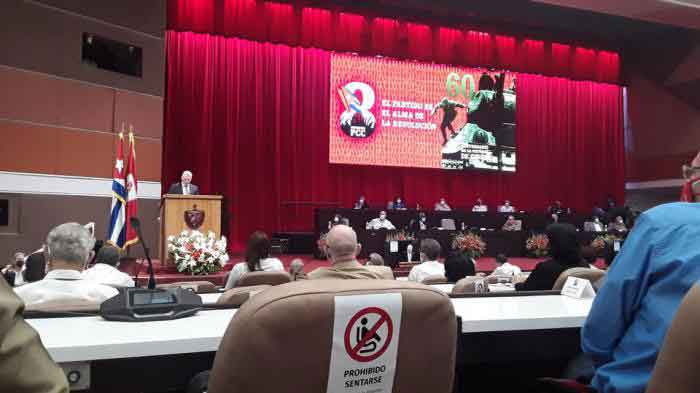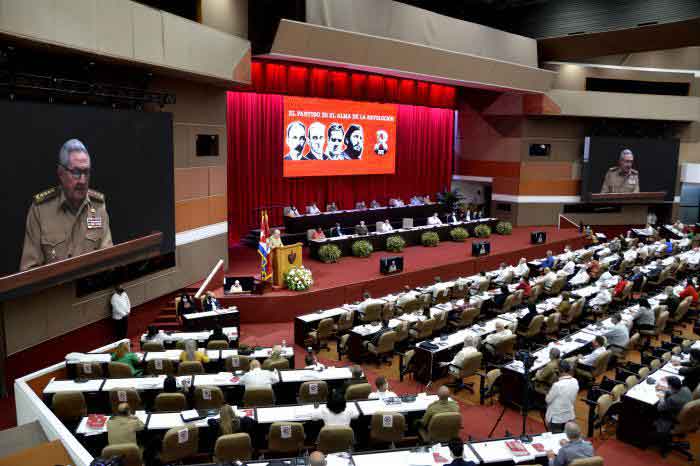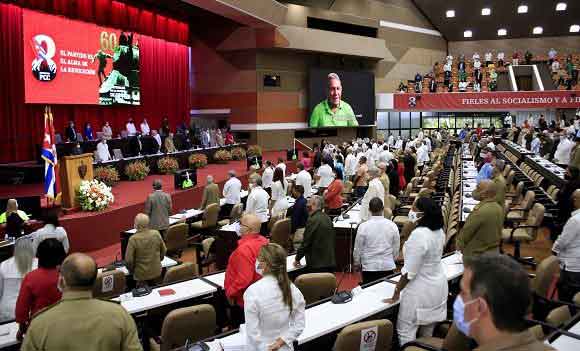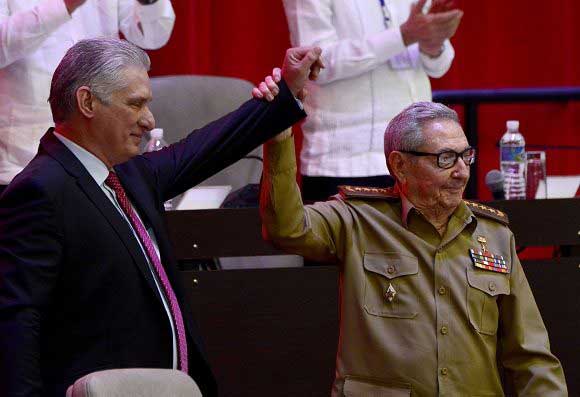
"With the Cubans, there are no manuals, be aware of that!" clarified a Spanish officer to another in the middle of a battle against the Mambises in a memorable cartoon film. The phrase, fruit of the genius of filmmaker Juan Padrón, symbolizes that delicious creativity that was reflected in the Eighth Congress of the Communist Party of Cuba (PCC).
The quote could be interpreted through three illustrative angles of the health of the political force that guides the destinies of the nation: the Central Report; the composition of the new Political Bureau and, in general, the Central Committee; and finally, the closing speech of the newly elected First Secretary, comrade Miguel Mario Díaz-Canel Bermúdez.
RAÚL'S LEGACY
 The Central Report to the Eighth Congress may be the political text left by Army General Raúl Castro Ruz since it was the last one he presented from an official position. It reflects his personal management style. As has been his custom, he pointed out serious difficulties facing the nation such as bureaucracy, corruption, and other "structural problems of the economic model that do not provide sufficient incentives for work and innovation."
The Central Report to the Eighth Congress may be the political text left by Army General Raúl Castro Ruz since it was the last one he presented from an official position. It reflects his personal management style. As has been his custom, he pointed out serious difficulties facing the nation such as bureaucracy, corruption, and other "structural problems of the economic model that do not provide sufficient incentives for work and innovation."
From the forcefulness of an impeccable revolutionary trajectory, Raúl returned to a constant during his tenure: "Greater dynamism in the process of updating the economic and social model." He made it clear that the socialist state will retain control over the National System of Health, Education, and basic services, as well as others no less relevant such as Foreign Trade and Finance. He particularly insisted that market regulation be fundamental "through the use of indirect methods, less and less administrative." He pointed out flaws in the social communication policy on controversial issues such as the expansion of dollarization by the domestic market, although he reiterated, it is a transitory step.
True to the memory of Commander in Chief Fidel Castro Ruz, he lashed out at inertia, immobility, and fear of exercising the powers granted, and prejudices towards non-state forms of ownership and management. In the internal sphere, he warned that the impersonation and interference of the Party in the functions and decisions that correspond to the Government continues to be very frequent.
He unequivocally called that being a vanguard Party and not an electoral machine, it is our duty to be the main guarantee of democracy and the permanent sincere and deep exchange of opinions; in such a way that the growing participation of citizens in fundamental decisions takes place.
THE RELAY PICKS UP SPEED
 The car of renewal within the Cuban political vanguard gave another blow to the clutch in the appointment that the Palace of Conventions hosted between April 16 and 19. Not only because of the election of Díaz-Canel as First Secretary, something already anticipated by Raúl himself, but also because the Historical Generation of the Revolution has completely ceded its space in the main party body: the Political Bureau (BP).
The car of renewal within the Cuban political vanguard gave another blow to the clutch in the appointment that the Palace of Conventions hosted between April 16 and 19. Not only because of the election of Díaz-Canel as First Secretary, something already anticipated by Raúl himself, but also because the Historical Generation of the Revolution has completely ceded its space in the main party body: the Political Bureau (BP).
Of the 14 members (three less than those elected in the Seventh Congress), five are newly promoted: Manuel Marrero Cruz, José Amado Ricardo Guerra, Luis Alberto Rodríguez López-Calleja, Lázaro Alberto Álvarez Casas and Gladys Martínez Verdecia.
Some of these faces reflect the narrow presence of the Party in key points of the Government. Others, such as Luis Alberto Rodríguez López-Calleja, send a clear message, show the confidence of this General of the Revolutionary Armed Forces (FAR), who heads one of the most strategic conglomerates in the country: the Business Administration Group (GAESA). Also, it makes explicit the determination of the maximum leadership of the Revolution not to give in even one iota to external pressures. Remember that the role of GAESA and several of its companies within the domestic economy was one of the current justifications for the Trump Administration to give the economic blockade another twist.
Besides Raúl, the commanders of the Revolution José Ramón Machado Ventura and Ramiro Valdés Menéndez gave up their seats in the BP; also, Leopoldo Cintra Frías, who was recently released with all the honors of his position at the head of the Ministry of the Armed Forces (MINFAR). Likewise, other well-known cadres such as Mercedes López Acea and Marino Murillo Jorge did it too. However, these latest movements do not sound the alarm, as most of them remain in other key positions. Perhaps, it is another way to reinforce administrative areas that deserve more attention.
Within the Central Committee, it is not idle to note the presence of party leaders from other institutions of Las Tunas, because together with Manuel René Pérez Gallego, first secretary of the Provincial Committee here; Yanays Bridón Contreras, head of the rehabilitation services at the Guillermo Tejas polyclinic; and Eduardo Walter Cueli, provincial director of Economy and Planning, were elected.
The rest of the Central Committee is made up of the secretaries of the provincial committees; professional Party officials at different levels; the vice president and the secretary of the National Assembly of People's Power, together with the governor of Santiago de Cuba and the vice governor of Havana. Three vice prime ministers take part, one of whom is, in turn, the Minister of Economy and Planning; key figures in the Comptroller's Office and the Attorney General's Office; followed by the holders of the Finance and Prices, Labor and Social Security, Domestic Trade, Tourism, Communications, Health and Science Technology and Environment portfolios.
There are also places for high officials of the FAR and the Ministry of the Interior (MININT); the national coordinator of the Committees for the Defense of the Revolution (CDR) and the second secretary of the Young Communist League (UJC); as well as for executives of Basic Industry, Construction, Tourism, and the Caribe store chain. Likewise, there are faces from the academic field such as the rectors of the Universities of Computer Sciences and Havana, seconded by heads of research centers; of Cuban collaboration abroad, the doctor who led the Henry Reeve brigade in Italy, directors of newspapers and television programs, ambassadors, trade unionists, and agricultural cooperatives. It is, in short, a heterogeneous Central Committee in terms of gender, territoriality, and representativeness of the various economic, political and Cuban civil society sectors; as it should be.
DÍAZ-CANEL PRINTS HIS STAMP

In almost two hours, the new First Secretary of the Central Committee spoke about his purposes at the head of the organization.
These objectives are clearly connected with the principles outlined by those who made the Revolution, both ethically and practically. This was demonstrated by reviewing the management at the head of the country of that young man who began his political struggle carrying our national flag in a student demonstration against the Batista dictatorship and who is now retiring from public life raised by a people who respect and love him. "Cuba needs him, he will be consulted on the strategic decisions of the greatest weight for the destiny of the nation," Díaz-Canel clarified, referring to Raúl.
Standing as a continuation of the work of his predecessors, the Cuban President anticipated necessary transformations that will have to be made in the work of the Party to ensure its leadership within Cuban society.
There will occur, he said, "changes in its work style, more in keeping with this time and its challenges,” materialized in greater confidence in young people. It will be time to maximize, transform into actions a group of words that are worth mentioning: “the presence, the prestige, the happiness, the decency, the rights, the efficiency, the quality, the culture of the detail, the beauty, the virtue, honor, dignity, and truth.”
He clearly emphasized his commitment to social communication, as he is convinced that it is an indispensable tool in decision-making. In fact, he recalled, many of the problems we suffer in the implementation of the ongoing economic transformations that have been fueled by underestimating the communicational aspect of these steps. "These are not times of printed newsletters or waiting for long processes of coordination and analysis to promote debates in our nuclei," he added; thus anticipating a greater presence of the party organization in digital spaces to activate the gears of its internal life.
"Unity must prevail without ever forgetting that you have to see the forest and also the trees," he commented in a clear allusion to the fact that consensus and not imposition are springs that in the long run will guarantee that the Party is heard, not because of the intensity of its voice, but by the force of its arguments; those that are strengthened in constant dialogue.
But let's be clear, we are not looking at a weak or timid First Secretary, much less prone to making compromises of principle. In another unbeatable respect for Fidel's legacy, he warned the employees of the evil industry that "the patience of this people has limits."
...
The interventions made in each of the commissions between Raúl's Central Report and Díaz-Canel's speech gave much more color to their general ideas. It is enough to say that they placed in the correct place of multi-causality and shared responsibility the Central Report's criticism of triumphalism in discourse in the public media.
This has been the Congress of dialectical denial, in which the veteran fighters demonstrated how much harvest they obtained by blood and sweat, perhaps more what they could have than what they would have wanted. Meanwhile, the young relay revered them and greeted them, cradling their dreams to find their way together.





